Public service cuts cast shadow over Swansea
- Published

The DVLA in Swansea employs 4,500 staff
On a windswept hill above the city it's clear to see just how completely the public sector dominates Swansea.
Forty thousand people in the city are employed in the public sector, working at the DVLA, Revenue and Customs, the Department for Work and Pensions, the city's universities, hospitals, schools and colleges.
The tower blocks shape the Swansea skyline. The coming cuts have cast a long shadow over this city by the sea.
"There's a real fear, everyone knows someone who works in the public sector and when the cuts come they're going to be deep," explains Roger Langley from the Public and Commercial Services union.
"Behind us is Morriston and the DVLA, that employs 4,500. We've got Swansea University, Singleton Hospital, County Hall, over to the Enterprise Park we've got the Land Registry that employs more than 450 staff. The DWP has got more than 600 staff, and, with the local authority, it's a big area of public sector workers.
"We don't know where the cuts are going to come, they're going to be across all departments."
Are people in this city frightened? I asked him.
The answer: "Yes, I think there is fear there."
I leave Roger and head back down to the waterfront.
The Ice House bar and restaurant in the SA1 development was busy, the warm autumn sun bringing mid morning coffee drinkers out to enjoy the views across the marina and the sea beyond.
Job for life
And it didn't take long to find public sector workers worried about what the future holds.
Paediatric occupational therapist Cathy Crosby told me the cuts were already biting.
"People are extremely worried, it's very uncertain," she said.
"People aren't being replaced when they're going on maternity leave or leaving because they're stressed."
Bernadette Stratford, who works in the registry office at Swansea University, told me times had changed and an academic career no longer means having a job for life.
"Traditionally academics have always worked in a sector where you had a job for a long time, there wasn't a high turnover of staff coming and going so I think there's perhaps more concern for academic staff for the time being," she added.

A symbol of Swansea developments - the 28-storey Meridian Tower, Wales' tallest residential building, which opened in 2009
So if large scale job cuts are on the way, what will that mean for the private sector?
Some economists think for every 100 jobs lost in the public sector, 30 more will follow in the private sector.
David Blackaby, professor of economics at Swansea University, said: "We're just outside a restaurant in SA1, you'd expect to see expenditure in those sort of thing cut back.
"People will use their car less, shop less, have fewer holidays, they'll delay the purchase of white goods, cars, that possibly could continue."
So if people are tightening their belts where does that leave the bars and restaurants here in SA1.
Chris Elliot opened the Ice House bar, restaurant and art gallery last November and he's just taken on more staff.
Christmas parties
"To be honest we're going to carry on doing what we're doing," he explained.
"We are mindful of the fact that these things are going to happen but the way we're running at the moment, we've just got to think smart and work hard.
"I think people need a break from the worry of what's going on, we've got comedy nights and bands booked."
Staff from the DVLA and the Environment Agency have booked the Ice House for their Christmas parties.
Will they still be coming, I asked Chris.
"Yes, I think they will,'" he told me.
The big problem for Swansea and indeed the rest of Wales is this - when the Spending Review is unveiled only part of the story will have been revealed.
The level of cuts to big Westminster-controlled departments like the DVLA and the Revenue and Customs may start to become clear.
But devolution means Wales must decided itself if health and education spending should also be cut.
And politicians in Cardiff Bay can only start to make those decisions once the cut in the block grant - the money given by Westminster to run Wales - is known, and that news should also come on Wednesday.
But where and when the axe will fall is still to be decided.
The uncertainly could last for many months.